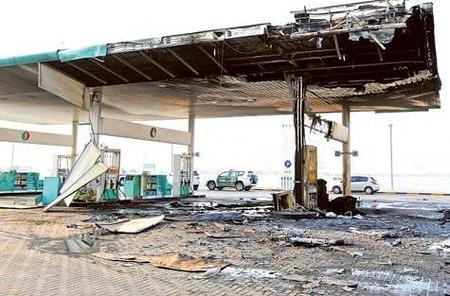
SAUDI CUTS BUGET

The drastic slide in global crude prices is expected to force Saudi Arabia, the world's leading oil exporter, to slash spending and cut back on the billions of dollars it spends on generous benefits for its citizens in next year's budget.
The oil-rich kingdom spent hundreds of billions of dollars at home in the past decade to bolster its economy and dole out subsidies that provide cheap energy and food for its 30 million people, as it enjoyed years of high crude prices. But the price of oil has fallen by more than half since the middle of last year, forcing the government to dip into reserves, reassess its spending plans and look for ways to diversify sources of revenue.
"I'm worried that prices would go up," said a man waiting for his SUV to be filled in a gas station in northern Riyadh this week. "There is a lot of talk but I think the government has put this into account," he said, adding that he expects the increase in prices to be small.
Saudi Arabia exports about seven million barrels of oil a day and those revenues make up around 90% of the government's fiscal revenues, and around 40% of the country's overall gross domestic product.
Saudi Arabia sees the need to cut output to boost prices but so far has been reluctant to do it alone. Officials say that preserving the country's share of the global market is more important.
The 2016 budget, expected to be unveiled in the coming days, will be the first major opportunity for the government to publicly outline a strategy to cope with a prolonged period of cheap oil and soothe the nerves of both the public and investors in the Middle East's largest economy.
It isn't clear whether ambitious and sensitive policy changes—such as privatizations and the cutting of energy subsidies—will be included. But even if energy subsidies are cut, the government is unlikely to immediately target consumers, who have become accustomed to some of the lowest gas prices in the world. Any reduction would risk a backlash from the public.
"My expectation is that it will start gradually, and that it will target non-consumers first," said Fahad Alturki, chief economist at Riyadh-based firm Jadwa Investment, of potential subsidy cutbacks. "We won't see a radical change....The change will be gradual, with a clear road map—and it may not be part of the budget."
This will be the first budget of King Salman's reign, drafted under the leadership of his son, Deputy Crown Prince Mohammed bin Salman, who heads the new economic council. The prince, speaking at a forum on economic policy last week, said making spending more efficient is a priority for 2016, according to people who attended the event.
The government will avoid burning through its foreign-exchange reserves to cover the deficit, and will instead focus on issuing bonds and borrowing, the prince said., who is expected to unveil a more comprehensive five-year economic plan in early 2016
Saudi Arabia's total foreign reserves had fallen to $648 billion by the end of October, down 13% from a peak of $746 billion in August 2014, according to the latest central-bank data. The kingdom still has sufficient reserves to absorb the shock of cheap oil, but it needs new sources of revenue to stabilize its finances in the longer term.
In an October report, the International Monetary Fund warned that, without reforms, the kingdom could run out of financial assets needed to support current spending within five years. It forecast this year's budget deficit to grow to more than 20% of gross domestic product. The kingdom's planned expenditure for 2015 was a record $229.3 billion.
In response to the collapse in oil prices, the government has already delayed a number of public projects and issued bonds for the first time since 2007.
Saudi citizen Bader al-Rabia said he spends around 50 riyals (about $13) a month on fuel for his white small sedan, but he would cut down on his daily rides if prices go up due to a cut in subsidies.
Faisal al-Faisal, a government employee, said he would welcome that. "I hope prices would increase because that would mean less traffic jams in the streets," he said.
The government recently introduced a tax on undeveloped land in urban areas that is likely to be implemented next year. Other taxes, including a value-added tax, are expected as part of the economic reform plan.
Its stock market, which opened to foreign investors in June, is among the worst performers globally this year, down about 15% to date as investors worry about the impact of cheap oil on the kingdom's economy.
-----
More:

